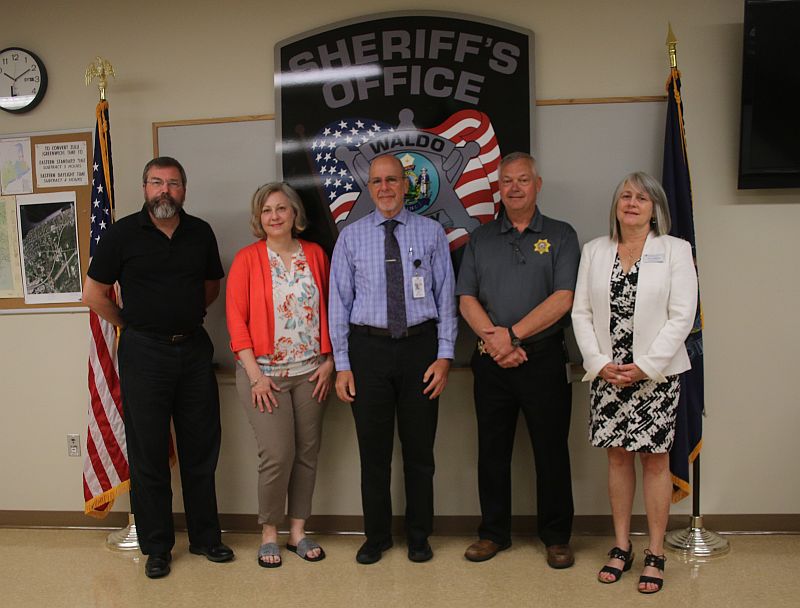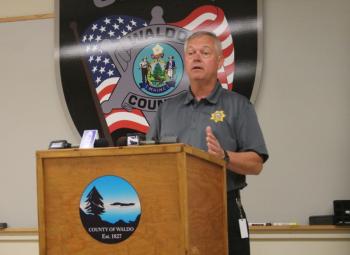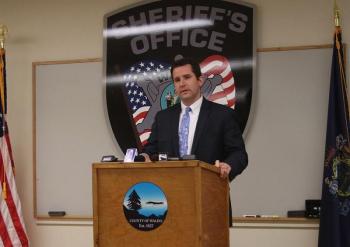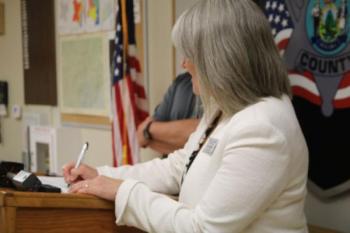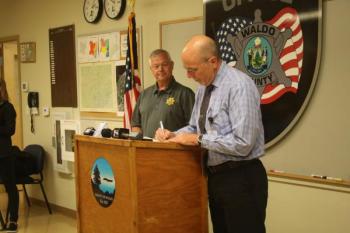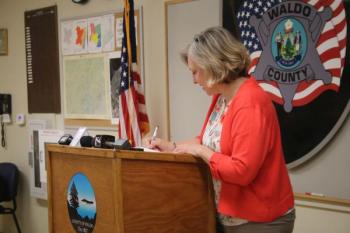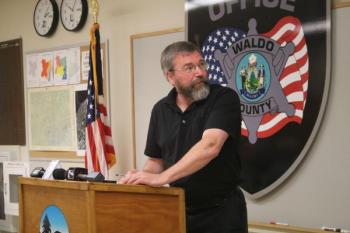Newly created Waldo County Recovery Committee signs pledge to combat opiate addiction
BELFAST — Members of a newly formed Waldo County group met at the Waldo County Sheriff’s Office June 14 to sign a ceremonial pledge about their collaborative effort to help people struggling with opiate addiction.
The Waldo County Recovery Committee involves a number of agencies, including the Waldo County Sheriff’s Office, Volunteers of America, Seaport Family Health Center, the Restorative Justice Project of the Mid-coast, Greater Bay Ministerium, and Maine Adult Community Corrections. Members of each group were on hand to sign the pledge.
The committee’s mission statement is:
“Waldo County Recovery Committee (WCRC) supports a vibrant community by providing a deeper understanding of substance use and mental illness, reducing stigma, improving access to treatment, and supporting families and those impacted by substance use. We favor efforts to divert people with substance use disorder and mental illness from the criminal justice system to medical treatment and community support. The WCRC measure success in improved quality of life in individuals and positive changes in community.”
Sheriff Jeffrey Trafton spoke to the gathered group, which included representatives from every participating organization, before calling them up to officially sign the pledge.
Trafton, who was approached about the idea for a committee by Chief Deputy Jason Trundy, said he’s learned a lot about addiction over his 35 years in law enforcement, including the last several months where he sat on the Opioid Task Force for the Maine Legislature.
He said his time on the task force helped to open his eyes and educate him about what the opioid problem is all about, and how devastating the problem is to “our country, to our state, and to our communities.”
“So I’m excited about what is happening here today and I think with all of the partners we have in this room here today we can make a difference, and we can make a real difference,” he said.
According to the group, deaths in Maine from both prescription painkillers and heroin have quadrupled between 1999 to 2013, reaching 418 overdose deaths in 2017. The rate of drug addicted babies born to Maine women has also increased by 480 percent between 2005 to 2014.
Trafton said the group is trying to look to existing resources, like the mental health and addiction services offered by Seaport Community Health Center. Funds for the group came from a state fund, called Community Corrections Money, which has a stipulation that it must be used for community correction services.
The group is a true collaboration, which Trafton said is always exciting for him, “because none of us can do this alone. All of use together with all of the resources that we have, that we can bring, I really believe we can make a difference,” he said, before calling up Waldo County District Attorney Jonathan Liberman, who is also the DA for Lincoln, Knox, and Sagadahoc counties.
Liberman told the gathering that “one thing that is a huge priority for my office is to break down as many barriers as there are between the court world and the law enforcement world, the treatment world, and the community. That’s key to combat the opioid and opiate epidemic.”
He said that he plans to use the Waldo County collaborative pledge to Knox County, where they’re in the very beginning stages of developing a collaborative.
Pledge: The following individuals and organizations, the Waldo County Sheriff’s Office, Volunteers of America Northern New England, Seaport Community Health center, the Restorative Justice Project of the Midcoast Maine, Maine Adult Community Corrections, and the members of the Waldo County faith based community through Greater Bay Area Ministerium have come together for the purpose of collaborating and coordinating our efforts to combat the opioid epidemic and effects of the use of heroin, fentanyl, opioids, and other illicit substances; and to encourage and strengthen the recovery community within Waldo County.
We the above having come together to form the Waldo County Recovery Committee, recognize that each entity represented brings unique and specific resources and experience to our collaborative efforts.
As the Waldo County Recovery Committee, we agree to meet frequently as a group to explore avenues for greater collaboration between our respective agencies and organizations to accomplish our goals.
We agree to identify and attempt to remove or mitigate, to the best of our abilities, any obstacles that exist that would prevent us from accomplishing our goals.
We agree that we will explore opportunities to collaborate with other community partners that are interested in contributing to accomplishing the goals of Waldo County Recovery Committee.
We agree that we will explore and evaluate new opportunities to enhance, expand and create a stronger and more vibrant recovery community within Waldo County.
The individuals and organizations comprising the Waldo County Recovery Committee are committed to partnering to positively contribute to the overall health and vibrancy of Waldo County.
Liberman also made sure to thank Dr. Hughes, of Seaport, for calling him about the collaborative, and Sheriff Trafton and Chief Deputy Trundy for their leadership in the program.
Chief Deputy Trundy was inspired to create the group by an already existing Lincoln County collaborative, which is led by good friend and Waldoboro Police Chief Bill Labombarde. Lombombarde invited Trundy to visit the program last fall.
Trundy said he was initially skeptical when Labombarde told him about the bi-weekly meetings in Lincoln County, which involve a member of law enforcement, a counselor, and a member of probation and parole, wondering whether a person struggling with addiction would want to work with the trio. But when he showed up the meetings were well attended, and the relationships between those running the group and the attendees was also apparent.
Labombarde, who had come from their group’s Thursday morning meeting to the pledge signing, said having members of law enforcement is key to the success of the program and meetings.
“It doesn’t work otherwise. People need to feel safe and they need to know what they’re going to say isn’t going to be used against them,” he said.
There are many members of the community who had long been working separately to combat the problem of addiction in Waldo County, including the participating organizations, but there was no unification in efforts, something all the groups said they believe is necessary to combat the opioid epidemic.
Labombarde said he considers the opioid crisis “our pandemic,” saying:
“We trained for that for years, you know, bird flu and west nile virus, all those things we had to be prepared for it. I think this one caught us by surprise. Just my opinion and I’m no expert, but I’m looking at this as our pandemic. I mean, it’s nationwide, we’re losing people every single day. Our little town of Waldoboro, we go [through] two to four cans of narcan in a week sometimes,” he said.
It took roughly five months from the time Trundy started visiting the Lincoln County meetings that he had members of his own Waldo County collaborative sitting around a table once a week.
Sheriff Trafton said it feels like “we’ve officially declared war on the opioid epidemic here in Waldo County.”
Most concerning for Trafton are the local overdose deaths, including a young mother who died on Christmas Day last year, while her children were in the home.
“That’s one that most sticks in my mind, but there are so many,” he said. “We can’t arrest our way out of this and I’m encouraged that we in the law enforcement profession have finally figured out we can’t do this alone and collaboration is the key. Over and over again, when you look at successful programs, successful efforts, it’s when everybody comes together and puts the resources together that good things happen,” he said.
Robyn Goff, program manager at the Maine Coastal Regional Reentry Center (RC), said the RC is very exciting about taking a look at addiction and reducing stigma and pooling resources.
“Helping one person really does have a ripple effect on the whole community, repairing families, relationships, making people employable, allowing them to have stable housing; just helping one person the ripple effect goes on and on,” she said.
District Attorney Liberman said it is crucial to have people talk.
“You have to have the community involved and you have to break down any barriers between law enforcement, the courts, and treatment,” he said. “I think that’s the formula for success.”
He continued: “One thing that as a prosecutor can be frustrating is a lot of times when someone’s file lands on your desk it’s because they’ve committed a crime that once you look into, you realize they’ve been slipping, having problems with drugs for months and months and sometimes years…. It would be great if everybody was working, including my office, to tackle this earlier rather than later when things get really out of hand. This approach, I really think makes the community safer in general.”
Chief Trundy said: “Jail is not the cure in the majority of these types of issues when you have someone in the recovery community, especially when they really, really want to get off whatever substance they’re on, and they want to get clean. We just need to facilitate to make that work.
He noted that Seaport’s “wraparound services for mental health and substance abuse” are great.
“They have their own meetings there, they have medically assisted treatment, they have a medical facility, so they’re a huge asset to us,” he said.
As for Waldo County meetings, Trundy said the new counselor will begin by holdings weekly meetings with the Waldo County population at Two Bridges starting the second week of July, after which he’ll start a weekly meeting here in Belfast.
Erica Thoms can be reached at news@penbaypilot.com


